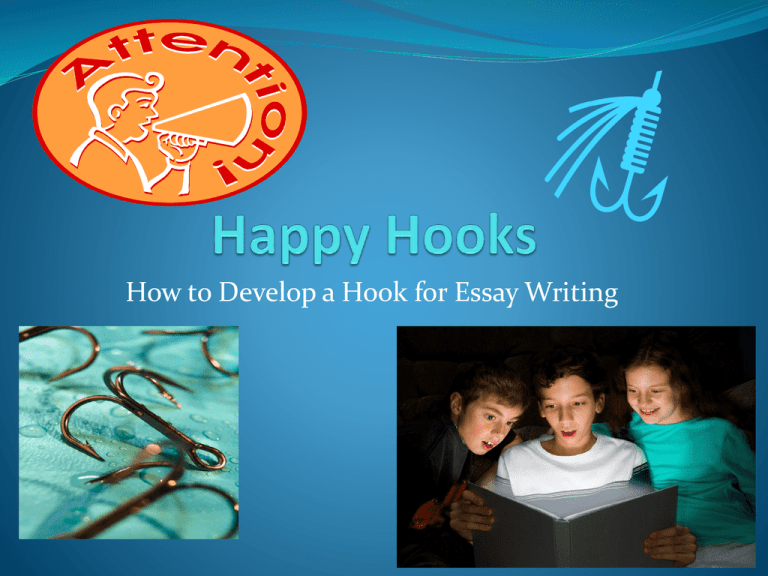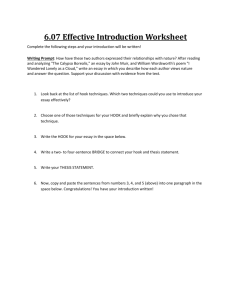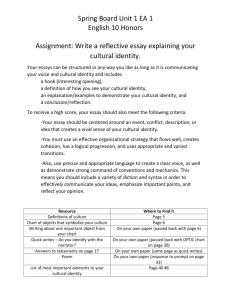Happy Hooks
advertisement

How to Develop a Hook for Essay Writing What is a Hook? An essay hook usually comes at the beginning of an essay's introductory paragraph and consists of an intriguing or vivid fact, detail or anecdote that introduces the essay topic. So What? How Important is a Hook? Writers use essay hooks to catch the reader's attention and compel him/her to keep reading. Since many people will put down an essay after a boring introduction, a well-written hook often determines whether or not an essay is effective. Writers can choose to refer back to the hook in the conclusion of their essay in order for a “full circle”/ stylistic effect. Hooks are used in all forms of writing (fiction/non-fiction) Types of Hooks Quotation When writing about literature, you might choose a quotation from the literary work itself or a quote from literary criticism about the piece. When writing about a heated issue you can use a quotation from one of the sides of that issue. A quotation introduction is truly effective when the quotation is unique, poignant and speaks directly to the heart of the essay's thesis. If your quotation cannot do those things then it should not be the leadin for your essay. Detailed Description If you need your reader to understand a person, situation or issue in order to understand your essay, then you might want to open your essay with a detailed description introduction. This type of opening gives your reader enough sensory detail about something that she feels she can see it, smell it, hear it, taste it or touch it. Detailed Description Cont. For instance, an essay about genocide might offer a detailed description of a child in an affected village staying awake all night afraid for his life. An essay about a particular type of food might give enough detail about the dish to make the reader's mouth water. The detailed description works well as an opening if you want to plant an image or idea in your reader's head before she reads the body of your essay. This helps the reader understand your essay before she has even read it. Question Using a question as the first sentence in your essay can help the reader interact with you as a writer. It makes the reader think about the subject of your essay and, possibly, relate that subject to his own life. For instance, an essay on global warming might ask a reader to think about what the world would be like if no one ever recycled. Or it might ask him to consider his own contribution to environmental efforts. Question Cont. An essay about literature might ask the reader if he has ever experienced something similar to the events in a novel. The question opener, like the quotation opener, is effective only when the question specifically relates to the rest of the essay. Statistics and Facts Opening with a specific fact or statistical data is particularly effective if that data will be relevant to the rest of your essay. The fact you use should be something that your reader does not already know, and if possible it should be something that will shock or surprise her. •Despite the recession, 75% of teens are receiving the same or more spending money this year than last year. •Working teens are saving up for the three Cs: clothes (57%), college (54%) and a car (38%). Statistics and Facts Cont. An essay on child labor laws might begin with the percentage of underage workers in your state or country. An essay on the environment might warn the reader that it will only take a certain number of years for the earth's resources to be depleted. This type of opening is intended to let your essay "hit the ground running," so to speak, and get straight to the point right away. You may return to this fact later in your essay but it should stand on its own without a lot of explanation. Tips for Writing a Happy Hook 1. Complete the first draft of your essay before beginning your essay hook. Make sure you have clearly defined your thesis and ensure that each paragraph further explains or defends your thesis. Warning: If you write your essay hook before completing a first draft, you risk developing a hook that does not flow into your essay topic. Tips for Writing a Happy Hook 2. Write down possible examples or anecdotes that illustrate your topic. If you've encountered surprising or interesting facts in your research/annotating, write these down as well. If you have trouble thinking of interesting facts, brainstorm reasons why your essay topic is significant. -Who does your topic affect? - What impact does it have on the world? Tips for Writing a Happy Hook 3. Read each potential hook into your introduction and determine which best leads into your thesis. Discard any which seem disconnected or irrelevant to your thesis. Tips for Writing a Happy Hook 4. Make sure your hook is specific to your essay. If your hook is a general statement that could lead into countless essays, such as "Conflict is an inevitable part of life" or "Love is blind," rewrite your hook to pertain to your exact topic. - In addition, avoid common proverbs and clichés, since these will not draw in your reader. Examples: •All is fair in love and war: This cliché stands for the premise that you can do whatever you have to in order to capture the heart of your lover •All’s well that ends well: This means that even if there were problems along the way, it doesn't matter as long as there is a happy ending •Every cloud has a silver lining: This means that even when bad things happen, it may be possible to find some good in them Tips for Writing a Happy Hook Edit your hook so that it is approximately one to two sentences long. In addition, ensure that the tone of your hook matches the tone of your essay. -For example, a very formal essay should not have a hook that includes slang or contractions, while an informal essay may succeed with a humorous hook. Time to Practice! Your essay “assignment” is to write an essay that focuses on the theme of PRIDE as it appears in “The Scarlet Ibis” by James Hurst. DIRECTIONS: Grab a textbook and open to “The Scarlet Ibis” Page 428 Create 3 possible hooks for an essay that would focus on the theme of PRIDE in “The Scarlet Ibis”. Record these hooks in your composition book. Tips: Your hook can be a quotation, question, or detailed description (in this case a statistic is not available for you to use). You can create more than 1 of the same type of hook- be creative! Think Pair Share Take turns reading all 3 of the hooks you created to a nearby partner. After you have each read all of your hooks- determine which hook of yours you each like the best and draw a STAR next to it. PREPARE TO SHARE! What Did We Notice? Which hooks grabbed your attention the most? Why do you think they were so impactful? What personal strategies did you use when creating your own hooks today? What have you used in the past? Why is a “good” hook so important in writing? Looking At Our Scale… Please hold up the “number” of fingers you feel describes your understanding of hook writing: 4- I totally get it 3- I get it 2- I’m beginning to get it 1- I need help 0- I am totally lost



